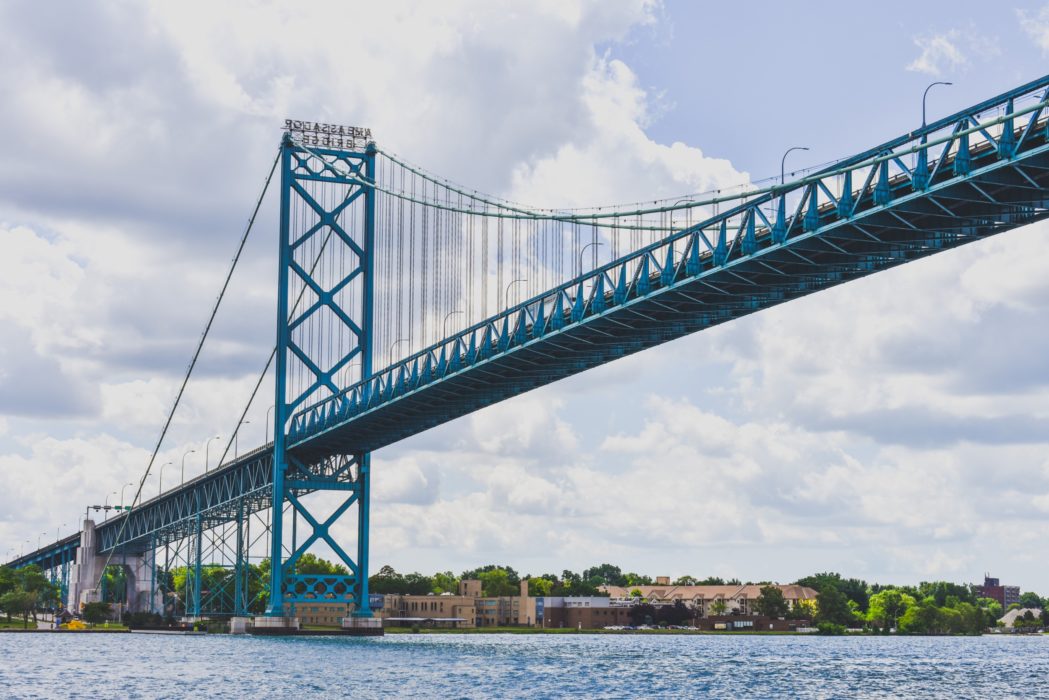
Ambassador Bridge Blockade Cost Nearly $300M In Auto Industry Losses
February 22, 2022
The weeklong Ambassador Bridge blockage that was cleared up Sunday cost Michigan and Ontario automakers and their workers $299.9 million in direct losses, according to an Anderson Economic Group (AEG) study released Monday.
AEG’s analysis includes lost production and wages at facilities in Michigan, Ontario, Kentucky, Alabama and Ohio. It impacted plants operated by General Motors, Ford, Chrysler, Toyota and Honda.
With the Ambassador Bridge closed by a human blockade of those upset about Canada’s mandatory vaccination policy, trucks were redirected to the Blue Water Bridge more than an hour away, where wait times stretched eight or nine hours, according to some reports.
The bridge protests hit the industry in a precarious parts situation sparked by pandemic-related supply chain problems. Patrick Anderson, CEO and principal at AEG, said “Many of the cars that weren’t produced during the past 10 days will not go to the customers that would have bought them, as those customers are already headed elsewhere or are simply going to go without a new car at this time . . .
“These are real losses to the men and women working in this industry,” Anderson said.
As tractor trailers were backed up at the Ambassador Bridge last week from the protests in Windsor, Sen. Stephanie Chang (D-Detroit) — outside of attempting to stay up to date on the situation — reflected on a couple points.
– How Metro Detroit residents deal with idling trucks is something residents deal with on a regular basis.
– How important U.S.-Canada relations are and how much the economies of the two countries are dependent on one another.
The Ambassador Bridge announced at 11 p.m. Sunday night that it is now fully open again, “allowing the free flow of commerce between the Canada and U.S. economies again.”
For nearly a week, protestors in Windsor had blocked traffic from getting onto the bridge toward the United States, paralyzing the auto industry on both sides of the border. Initially, the protests were over Canada’s mandatory vaccines for cross-border truckers, but since morphed into COVID-19 vaccines and other topics.
The Detroit International Bridge Co. said throughout the protest the bridge company supported truck drivers by providing meals and coffee to keep them going during the unpredictable wait time.
Monday evening, the Windsor Starreported 25-30 protestors had been arrested.
Chang said on this week’s MIRS Monday podcast a Ford executive told her because of the protestors closing the Bridge for weeks, parts were airlifted from one side of the Detroit River.
“Canada is a huge trading partner. If we haven’t learned that before, we certainly learned that now,” Chang said. “We have to pay attention to what’s going on in Canada and pay attention to what’s going on at border crossings.”
Chang called the Republicans’ outspoken support of protestors “ridiculous.” To her, this wasn’t a freedom of speech issue. These were trespassers who were blocking traffic and breaking Canadian law. This impacted both nations’ economies and the jobs of workers on both sides of the border.
“These protestors are the fringe who are not necessarily acting with people’s best interest at heart,” she said.
The Michigan Department of Treasury estimates that 10,000 commercial vehicles cross the bridge each day with $325 million of goods. Approximately $50 million is from automotive parts. Nearly 30% of the annual trade between Michigan and Canada comes across the Ambassador Bridge.
“It’s important to ensure that this does not happen again,” said Gov. Gretchen Whitmer. “I will work to protect the economic freedom and well-being of families and businesses in Michigan. We’ve made incredible progress to grow Michigan’s economy together, adding 220,000 jobs year over year. I know we can keep this momentum going, create good-paying jobs, and lower costs to help families and businesses thrive.”